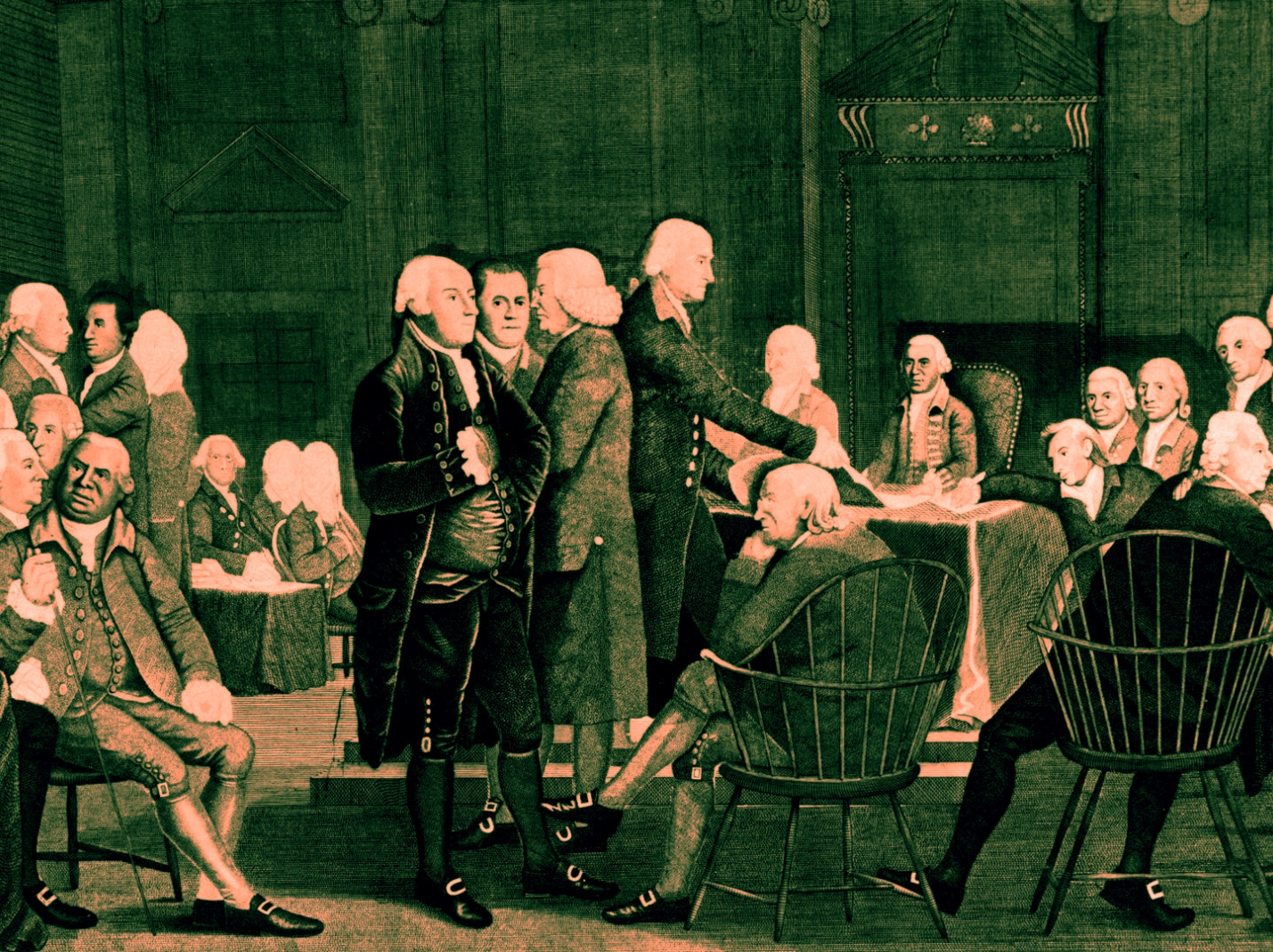
The First Continental Congress convened on September 5, 1774, in Carpenters’ Hall, Philadelphia. It brought together delegates from twelve of the thirteen North American British colonies to discuss what they might do collectively in response to the “Intolerable Acts” passed by the Crown in May and June.
The Congress was not a revolutionary act. Indeed, it was an effort to tame the revolutionary fervor that had broken out first in Massachusetts and had spread to other colonies. The idea was that instead of launching a boycott of all British imports, the cooler heads of the merchants and political leaders would find a path of reconciliation between Britain and her colonies.
The Congress got off to a wobbly start as delegates argued about whether to meet at Carpenters’ Hall or the Pennsylvania State House and what rules to follow in making decisions. They ended up with a one-colony-one-vote rule and two committees. One committee was to “state the rights of the Colonies in general,” and the other focused on statutes affecting trade and manufacturing. The Congress also decided to keep its proceedings secret.
The secrecy held to the degree that historians have had a hard time determining who said what at the First Continental Congress, but the British Secretary of State for the American Colonies received an initial account through an indiscretion by Benjamin Franklin’s son, William. No real harm came from it. By the fourth day of the Congress, the delegates had had lots of vigorously argued debates and had settled a few matters. The colonies, for example, would not pay compensation to the British for the tea dumped in Boston Harbor. But on the whole, the First Continental Congress, after giving the more radical representatives such as Patrick Henry a chance to vent, settled on a wait-and-see approach. All of the more provocative measures, such as raising an armed militia in each colony, were voted down.
John Adams wrote the delegates were “fixed against Hostilities and Ruptures, except they should become absolutely necessary, and this Necessity they do not yet See.”
The Congress did not adjourn until late October, after it had voted down a plan to renegotiate Britain’s imperial relations with the colonies and instead used nonimportation rules to put commercial pressure on Britain. Such agreements were not easily enforced, which meant that the First Continental Congress essentially kicked the can down the road. They formed a Continental Association with fourteen provisions to curtail trade and a call on “local committees” around the colonies to enforce the rules. This set up abundant opportunities for the colonists to find new grievances.
On the second day, September 6, the First Continental Congress delegates received a false report that red coats had fire on and killed six Americans at an arsenal in Boston, and the British were now bombarding the city. This became known as the Powder Alarm, which has its own little history. The readiness with which some delegates to the First Continental Congress believed it to be true testifies to the edginess of this meeting. Matters settled down on September 8, when news accentuated the delegates’ desire to treat outright rebellion as unacceptable.
The best part of the First Continental Congress is that it wasn’t the last Continental Congress. We tried temperance, but it didn’t work.
My account follows Mary Beth Norton. 1774 :The Long Year of the Revolution. Alfred A. Knopf. 2020.
Art by Beck & Stone
What strikes me, as a 21st Century American, is how very British they were — how they kept stating that they were the King’s loyal subjects and how they sought to please the King. Even today, their national anthem is “God Save the King.”
Can you imagine saying that about the President? I doubt that *anyone* can imagine saying it about *all* the past five Presidents — Clinton, Bush 43, Obama, Trump, and Biden.
From the diaper-clad Trump balloons to the “Let’s Go, Brandon” banners, we mock and insult our Presidents. We are not “loyal subjects” and we definitely don’t seek to “please” the President. That doesn’t mean that we are fomenting revolution, only that we have a completely different relationship with our sovereign.
We’ve had three impeachments in less than 30 years — can you imagine the House of Commons impeaching King George?.